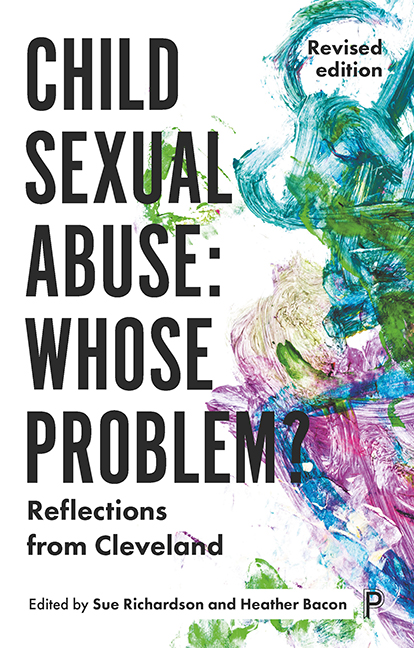Book contents
- Frontmatter
- Dedication
- Contents
- List of tables and figures
- List of abbreviations
- Notes on the editors and contributors
- Acknowledgements
- Preface
- Introduction:Why Cleveland still matters: connections with a new era
- one From Colwell to Cleveland: 1973 to 1988
- two A framework of belief
- three The medical diagnosis of child sexual abuse: the paediatrician’s dilemma
- four After the medical diagnosis: everyone’s dilemma
- five The continuum of disclosure
- six Seen but not heard: the children of Cleveland
- seven The unwanted message: child protection through community awareness
- eight Questions not answers: progressing the debate
- Conclusion:Thirty years later: how far have we progressed?
- Appendix
- References
- Index
Conclusion:Thirty years later: how far have we progressed?
Published online by Cambridge University Press: 13 April 2022
- Frontmatter
- Dedication
- Contents
- List of tables and figures
- List of abbreviations
- Notes on the editors and contributors
- Acknowledgements
- Preface
- Introduction:Why Cleveland still matters: connections with a new era
- one From Colwell to Cleveland: 1973 to 1988
- two A framework of belief
- three The medical diagnosis of child sexual abuse: the paediatrician’s dilemma
- four After the medical diagnosis: everyone’s dilemma
- five The continuum of disclosure
- six Seen but not heard: the children of Cleveland
- seven The unwanted message: child protection through community awareness
- eight Questions not answers: progressing the debate
- Conclusion:Thirty years later: how far have we progressed?
- Appendix
- References
- Index
Summary
Editors’ summary
We conclude with a new discussion of unresolved dilemmas for child protection and recommendations for future directions. We argue for a new dialogue about policy and practice based on the principles and practice of co-production with experts by experience and the other members of the community in an equal partnership. We stress the need to re-orientate the whole child protection system to accept the responsibility for asking children and young people about abuse and actively reach out to help and support those who cannot easily tell. Specific recommendations are made in order to reach these goals.
Although the events leading up to the Butler-Sloss Inquiry into Child Abuse in Cleveland and the resulting Inquiry Report itself are rightly seen as part of a watershed time with respect to the acknowledgement of child sexual abuse in the United Kingdom, any feeling of complacency that by 1987 we then knew all about sexual abuse was clearly misplaced. It is only in more recent times that many victims have felt sufficiently confident to speak about what has befallen them, sometimes many years ago. The step change in our society's understanding of the prevalence of child sexual exploitation that has followed from disclosure of the crimes of Jimmy Savile and others and, in a different context, the crimes committed in Rotherham and elsewhere has been of great significance in modern times
But that step change, just as with the Cleveland Inquiry, important though they both have been, are no more than staging posts on the long road carefully travelled that is our collective journey towards understanding of, and full acceptance of, the prevalence of child sexual abuse. (The Rt. Hon. Lord Justice McFarlane, 2015)
Cleveland as a staging post: changing the discours
We believe that the legacy of Cleveland can now be addressed. The toxic myths generated at the time can lose their power when re-examined in the present, better-informed climate. This can help to shift the burden of carrying the truth from the witnesses – survivors and their advocates – to be shared by society as a whole. Given the numbers of adults now coming forward to reveal abuse they suffered as children in the subsequent three decades, and the greater public awareness and sympathy, our society should now be addressing the issues collectively and systematically.
- Type
- Chapter
- Information
- Child Sexual Abuse: Whose Problem?Reflections from Cleveland (Revised edition), pp. 219 - 236Publisher: Bristol University PressPrint publication year: 2018



